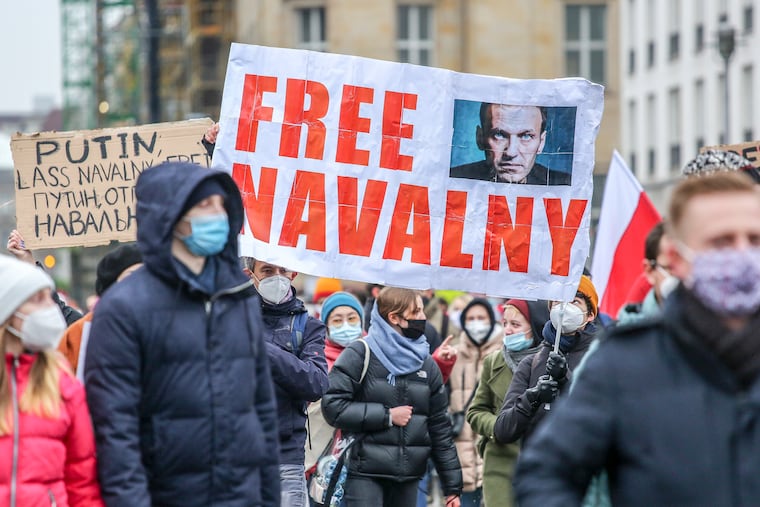The U.S. announces sanctions on Russia over the poisoning and jailing of opposition leader
The sanctions are largely symbolic, but represent the first Biden administration action against Russia.

WASHINGTON — The Biden administration on Tuesday announced punitive sanctions on senior Russian government figures over the poisoning of opposition leader Alexei Navalny and reiterated a demand that Navalny be released from detention.
The sanctions block access to financial or other assets in the United States for seven top figures around Russian President Vladimir Putin.
They are largely symbolic, but represent the first Biden administration action against Russia. U.S. officials who described the measures said they are a signal that the new administration will treat Russia differently than the Trump administration did.
"So to be clear, the United States is neither seeking to reset our relations with Russia, nor are we seeking to escalate," said one official who spoke to reporters about the sanctions.
The Biden administration also announced new export restrictions on items that could be used to manufacture chemical weapons and a widening of existing sanctions under a law controlling use of such weapons.
The officials, who spoke on the condition of anonymity to describe the actions before they were imposed, did not release names of those targeted. The names are expected to be made public later Tuesday.
Navalny was poisoned in August 2020. He recovered in Germany, but was jailed upon his return to Moscow in January. He was sentenced to more than two years behind bars on what human rights advocates call manufactured charges.
The U.S. sanctions largely mirror actions taken by the European Union last fall. At the time, the Trump administration declined to join the action. Former president Donald Trump had been reluctant to assign blame for the attack on Navalny, who nearly died.
The E.U. added sanctions last month over Navalny's imprisonment.
"Russia is drifting towards an authoritarian state and driving away from Europe," E.U. foreign policy chief Josep Borrell said in announcing the latest asset freeze. "It is interested in confrontation and disengagement from the European Union."
» READ MORE: Relations between the European Union and Russia worsen over the Alexei Navalny jailing
One of the U.S. officials who spoke Tuesday said the United States shares Borrell's assessment.
U.S. officials said the new actions are based on U.S. intelligence findings that implicated the Russian state with "high confidence." Navalny was poisoned by the nerve agent Novichok, which was developed as a Soviet weapon of war.
"Russian officials have targeted Mr. Navalny for his activism and efforts to reveal uncomfortable truths about Russian officials' corruption and to give voice to Russian citizens legitimate grievances with their government and its policies," one senior administration official said.
The sanctions in response to Navalny's poisoning are just the first in a series of steps the administration is taking to hold Russia to account for destabilizing actions in four areas, senior administration officials said.
Coming “sooner rather than later” will be responses to Moscow’s SolarWinds hacks of federal agencies and private sector entities, any malign activity in the 2020 election and reports of Russian bounties on the lives of U.S. troops in Afghanistan, an official said. All four areas — Navalny’s poisoning, SolarWinds, election activity and bounties — were the subject of intelligence community reviews ordered by President Joe Biden on his first full day in office.
Alexander Gabuev, a senior fellow at the Carnegie Moscow Center, said the administration's coordinated response with Europe is more effective than its predecessor's go-it-alone approach. But, he said, it is "very unlikely to change the fate of Mr. Navalny. It will impose costs on Russia, but the costs are totally bearable."
There was no immediate response from the Kremlin following the U.S. announcement. Earlier Tuesday, Putin spokesman Dmitry Peskov was asked about the likelihood of U.S. sanctions.
Sanctions are not an effective way for countries to achieve their goals, Peskov replied.
"It is high time for those who continue to rely on the use of restrictions in relations with other countries to think about whether they are capable of achieving their goals through such a policy or relations are only getting worse and it's their own fault," Peskov said, according to the Russian news agency Tass.
"In any case, we will be guided by our own interests," Peskov added later.
On Monday, United Nations human rights experts urged an international probe into the attack on Navalny, Putin's most prominent critic.
Navalny’s arrest in January led to mass protests in Russian cities that pose an unusual threat to Putin’s authority.
Two days after his arrest, he starred in a bombshell video released through supporters that accuses Putin of colossal corruption.